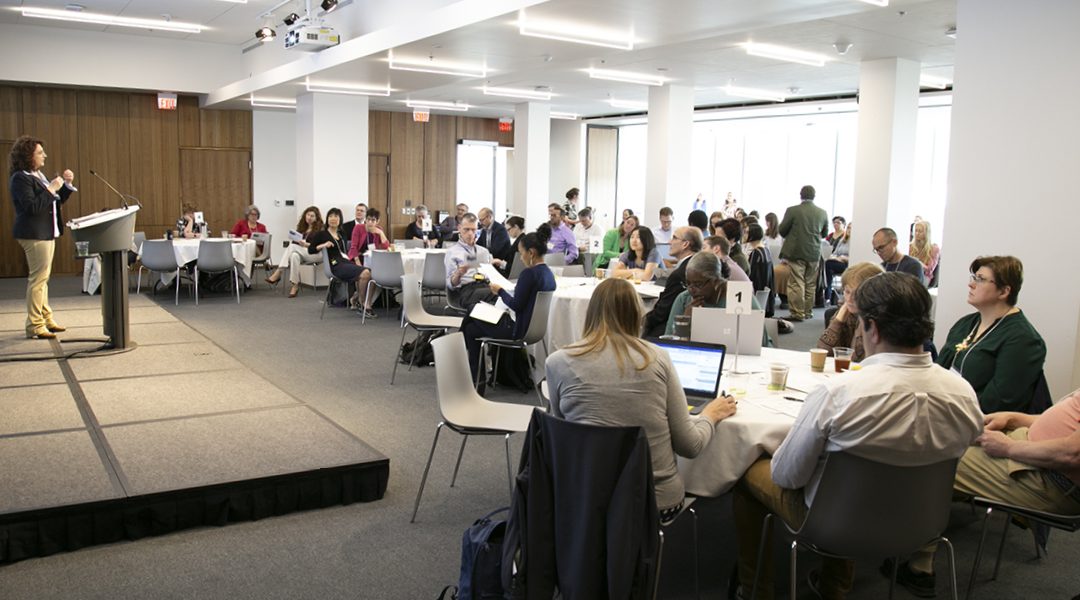Rackham Graduate School recently hosted the first in a new series of faculty conversations for advancing research-based innovation in graduate education. The inaugural Rackham Faculty Symposium featured presentations and discussions around what is being learned about graduate-student academic life and what measures can be taken to meet the changing dynamics of research, scholarship, and career pathways. Sixty-three faculty members from 12 U-M schools and colleges and all three campuses joined Rackham academic leaders, staff, and others to share ideas and priorities to reimagine the graduate academic experience as a cornerstone of excellence at Michigan.
“This symposium served as an important aspect of the graduate school’s strategic planning for the next several years,” says Rackham Dean Mike Solomon. “Our ultimate goal is to catalyze a collaboratively designed, inclusive student experience in which the academic, scholarly, and professional goals of each student are incorporated into their curricula, research, and mentoring.”
The symposium featured three presentations, each followed by a discussion period:
- Insights from the Michigan Doctoral Experience Study: Developing Academic Identity
John Gonzalez, Director of Institutional Research, Rackham Graduate School
Allyson Flaster, Research Fellow, Rackham Graduate SchoolIn keeping with Michigan’s role as a national leader in graduate education, the Michigan Doctoral Experience Study examines the development of academic and scholarly identity over the trajectory of doctoral work and into early career development. It aims to help educators understand the impact and effectiveness of the experiences that shape the success of graduate students through the doctorate and beyond. The study also seeks to advance scholarship on doctoral education and inform Rackham programs to help develop programming and policies that better meet the needs of students.
- Context Matters: Factors for the Success of Underrepresented Students, from Doctoral Study to the Professoriate
Tabbye Chavous, Director, National Center for Institutional Diversity • Professor of Education, School of Education • Professor of Psychology, College of Literature, Science, and the Arts
Chavous’s talk highlighted the mechanisms that affect the persistence of underrepresented students in graduate programs, and the strategies that can positively impact their success. It addressed results from social-science research sponsored by the National Science Foundation that examined the contextual and individual factors that affect student success in doctoral programs, including comparison of findings for students from demographic groups who are underrepresented in their programs and those who are not.
- Developing Research-Based Innovations and Practices to Improve the Graduate Academic Experience Through the Mcubed Framework
Valeria Bertacco, Associate Dean for Physical Sciences and Engineering, Rackham Graduate School • Arthur F. Thurnau Professor and Professor of Electrical Engineering and Computer Science, College of Engineering
This conversation focused on Mcubed funding that Rackham is making available for faculty projects that explore and also develop research about effective practices, innovations, and interventions in graduate education, or that make use of the university’s data resources to understand the graduate-students experience and propose ways to improve it.
The presentations were followed by breakout discussions and report-outs.
“Graduate education is essential to Michigan’s academic excellence,” says John Godfrey, Rackham assistant dean for academic programs and initiatives. “The landscape of graduate education is changing quickly. We have the opportunity to study these changes and to use this knowledge to ensure that Rackham’s programs continue to be leaders in the advanced training that graduate education offers.”
Rackham plans to engage the broader campus community around these questions with events this September and in January 2020.

